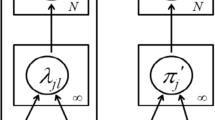Abstract
We propose and analyze a new vantage point for the learning of mixtures of Gaussians: namely, the PAC-style model of learning probability distributions introduced by Kearns et al. [13]. Here the task is to construct a hypothesis mixture of Gaussians that is statistically indistinguishable from the actual mixture generating the data; specifically, the KL divergence should be at most ε.
In this scenario, we give a poly(n/ε) time algorithm that learns the class of mixtures of any constant number of axis-aligned Gaussians in R n. Our algorithm makes no assumptions about the separation between the means of the Gaussians, nor does it have any dependence on the minimum mixing weight. This is in contrast to learning results known in the “clustering” model, where such assumptions are unavoidable.
Our algorithm relies on the method of moments, and a subalgorithm developed in [9] for a discrete mixture-learning problem.
Preview
Unable to display preview. Download preview PDF.
Similar content being viewed by others
References
Achlioptas, D., McSherry, F.: On spectral learning of mixtures of distributions. In: Auer, P., Meir, R. (eds.) COLT 2005. LNCS (LNAI), vol. 3559, pp. 458–469. Springer, Heidelberg (2005)
Arora, S., Kannan, R.: Learning mixtures of arbitrary Gaussians. In: Proceedings of the 33rd Symposium on Theory of Computing, pp. 247–257 (2001)
Cover, T., Thomas, J.: Elements of Information Theory. Wiley, Chichester (1991)
Cryan, M., Goldberg, L., Goldberg, P.: Evolutionary trees can be learned in polynomial time in the two state general Markov model. SIAM Journal on Computing 31(2), 375–397 (2002)
Dasgupta, S.: Learning mixtures of gaussians. In: Proceedings of the 40th Annual Symposium on Foundations of Computer Science, pp. 634–644 (1999)
Dasgupta, S., Schulman, L.: A Two-round Variant of EM for Gaussian Mixtures. In: Proceedings of the 16th Conf. on UAI, pp. 143–151 (2000)
Dempster, A.P., Laird, N.M., Rubin, D.B.: Maximum likelihood from incomplete data via the EM algorithm. J. Royal Stat. Soc. Ser. B 39, 1–38 (1977)
Feldman, J., O’Donnell, R., Servedio, R.: PAC learning mixtures of Gaussians with no separation assumption. available at: http://research.microsoft.com/~odonnell
Feldman, J., O’Donnell, R., Servedio, R.: Learning mixtures of product distributions over discrete domains. In: Proc. 46th IEEE FOCS, pp. 501–510 (2005)
Freund, Y., Kearns, M., Ron, D., Rubinfeld, R., Schapire, R., Sellie, L.: Efficient learning of typical finite automata from random walks. Information and Computation 138(1), 23–48 (1997)
Freund, Y., Mansour, Y.: Estimating a mixture of two product distributions. In: Proceedings of the 12th Annual COLT, pp. 183–192 (1999)
Kannan, R., Salmasian, H., Vempala, S.S.: The spectral method for general mixture models. In: Auer, P., Meir, R. (eds.) COLT 2005. LNCS, vol. 3559, pp. 444–457. Springer, Heidelberg (2005)
Kearns, M., Mansour, Y., Ron, D., Rubinfeld, R., Schapire, R., Sellie, L.: On the learnability of discrete distributions. In: Proc. 26th STOC, pp. 273–282 (1994)
Lindsay, B.: Mixture models: theory, geometry and applications. Institute for Mathematical Statistics (1995)
Naor, M.: Evaluation be easier than generation. In: Proceedings of the 28th Symposium on Theory of Computing (STOC), pp. 74–83 (1996)
Titterington, D.M., Smith, A.F.M., Makov, U.E.: Statistical analysis of finite mixture distributions. Wiley & Sons, Chichester (1985)
Valiant, L.: A theory of the learnable. Communications of the ACM 27(11), 1134–1142 (1984)
Vempala, S., Wang, G.: A spectral algorithm for learning mixtures of distributions. In: Proceedings of the 43rd IEEE FOCS, pp. 113–122 (2002)
Author information
Authors and Affiliations
Editor information
Editors and Affiliations
Rights and permissions
Copyright information
© 2006 Springer-Verlag Berlin Heidelberg
About this paper
Cite this paper
Feldman, J., Servedio, R.A., O’Donnell, R. (2006). PAC Learning Axis-Aligned Mixtures of Gaussians with No Separation Assumption. In: Lugosi, G., Simon, H.U. (eds) Learning Theory. COLT 2006. Lecture Notes in Computer Science(), vol 4005. Springer, Berlin, Heidelberg. https://doi.org/10.1007/11776420_5
Download citation
DOI: https://doi.org/10.1007/11776420_5
Publisher Name: Springer, Berlin, Heidelberg
Print ISBN: 978-3-540-35294-5
Online ISBN: 978-3-540-35296-9
eBook Packages: Computer ScienceComputer Science (R0)




